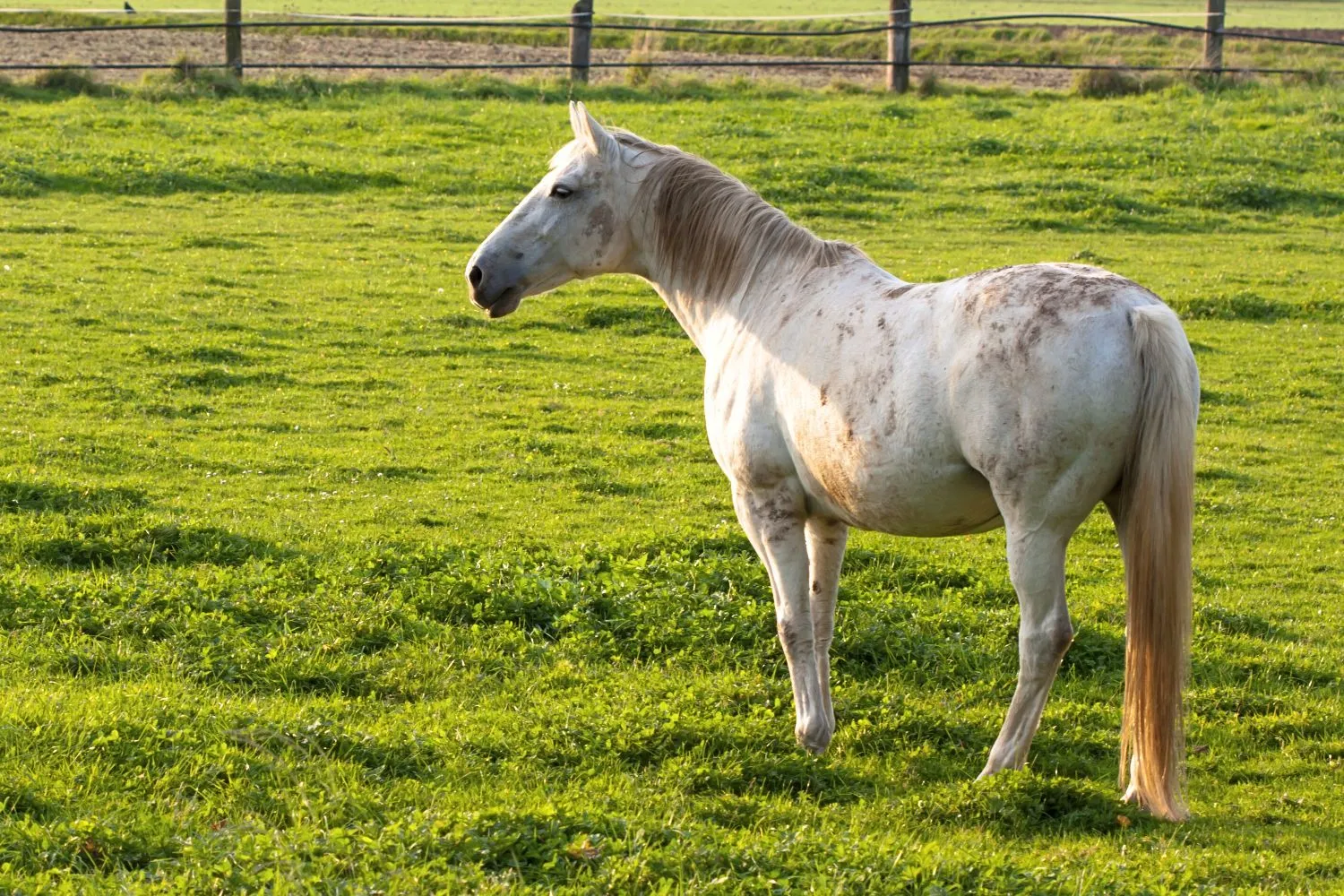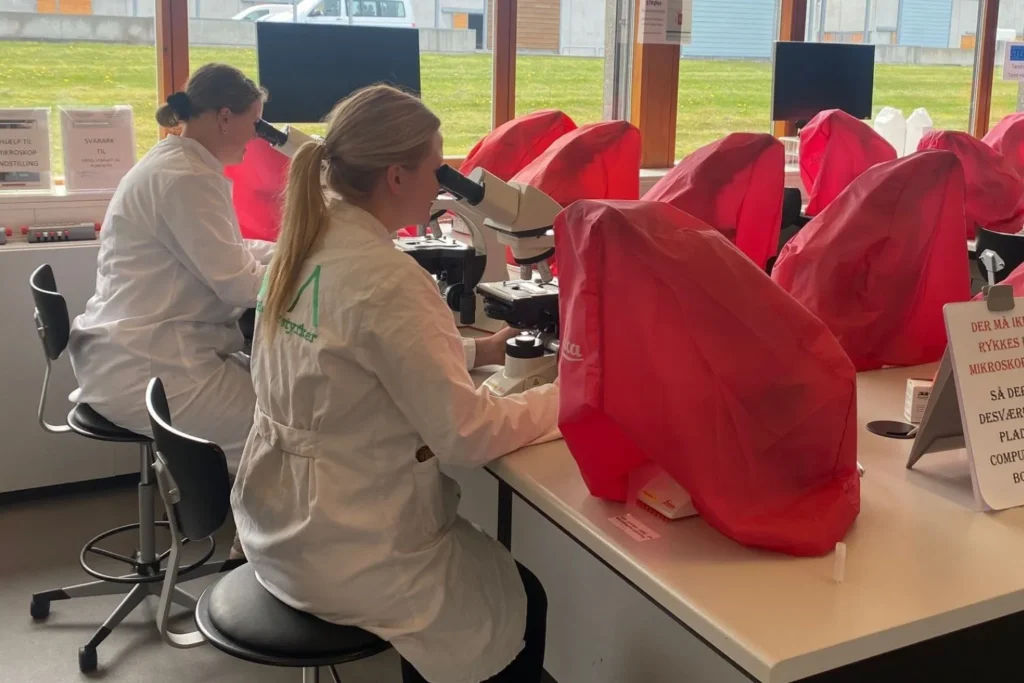Menu

What about those manure tests? We have spoken with Tina Pihl, an expert in manure tests and deworming in horses. She explains that worms and parasites are a serious issue. Unfortunately, not all worms can be detected through a standard manure test where only eggs are counted. Therefore, it is important to also conduct larval cultivation for bloodworms and a test for tapeworms and to adhere to the guidelines Tina Pihl elaborates on.
Manure tests and deworming are not quite as straightforward as we might think. Many of us might have the idea that if we test the horse twice a year and administer dewormers when the veterinarian diagnoses a certain amount of eggs in the manure, then there is nothing to worry about. However, according to veterinarian Tina Pihl, that is not the case. We need to be much better at examining and preventing worms.
In a standard egg count, you can test for roundworms and small strongyles, also called Cyathostomes, but it is also important to test for tapeworms with a specific test and for bloodworms through larval cultivation. These are the types of parasites typically tested for in Denmark, as they are the most common cause of disease.
In 1999, it was introduced in Denmark that dewormers are prescription-only. This was done because there was a lot of focus on the development of resistance among worms to dewormers. This means that a veterinarian must diagnose a horse with worms based on a clinical examination and/or a diagnostic test such as a manure test or blood test before they can prescribe a dewormer. Prescription requirements apply throughout the EU (since 2008), but in many other countries, dewormers are freely available to all horse owners.
A manure test is a small sample of faeces collected from the horse shortly after it defecates.
Various tests for worms can be performed on a manure sample.
The most common is an egg count (McMaster), which shows how many parasite eggs the horse is shedding.
A manure test can differentiate between some parasite eggs, but not all types of worms can be identified.
Tina Pihl graduated as a veterinarian in 2002 and has a PhD in colic in horses. She is an associate professor in internal medicine at the University Hospital for Large Animals and an expert in manure tests, deworming, and parasites. Tina Pihl has been researching equine bloodworm (Strongylus vulgaris) since 2015 and teaches and advises about it. She owns a horse herself and is therefore familiar with the dilemmas that horse owners may face.
Maybe you have heard this before but let us go over it again.
If we say there are ten horses together, and they all get tested. Statistically, the result will show that two of the horses will shed 80% of the eggs in the whole herd. This fact underscores why we should use an egg count and not just deworm all 10 horses. Only the two horses shedding the most eggs are the ones contributing most to the contamination in the field – and therefore, they are the ones that need to be treated.
It sounds easy and manageable, BUT there is a plot twist because there is not necessarily a correlation between the number of eggs in the manure and the number of worms inside the horse.

This means that the two horses in the herd of 10 that shed many eggs may spread the contamination, but they may not necessarily have many worms and parasites inside them. They may not necessarily be the ones getting sick.
It could be some of the other eight horses that do not shed many eggs. They can have many worms and parasites inside them and thus become sick. This could be because parasites can be in different life stages when the horse is tested. They can lie dormant and they can migrate around the body and therefore not be visible in the manure.
To avoid any horses getting sick, it is therefore very important to look at the entire herd. The 20% shedding eggs need to be treated so the other 80% are not infected and do not get sick.
Tip: If the horse is outside, take it to a place where it feels a bit uncomfortable. Here it will typically defecate. It could be in a trailer, the water trough area, by a bridge, or a large machine.
There is a herd of research horses at the University of Kentucky that has existed since the 1970s, and none of those horses have ever been given a dewormer? "Wild" horses can live with worms and parasites just fine as long as they are healthy. "But the young horses often look bloated and scruffy,"
says Tina Pihl.

Yes and no – it depends on a lot of things. Whether the horse gets sick depends on the number of worms and the horse's overall health. It is perfectly natural for horses (and actually all mammals) to have worms in their digestive system. That is explained by the veterinarian and researcher here.
"We cannot eradicate worms, and we should not. Worms should be there, and horses live with worms without problems, and it stimulates their immune system. So, there are also many good things about parasites."
But the quantity can be decisive for whether the horse gets sick. "We need to prevent the horses from getting sick, so the worm population should be at a level where there are not too many," Tina Pihl elaborates.
The horse can get sick in many different ways. It depends solely on what type of worm or parasite the horse has. It is often seen as diarrhea, fever, or colic symptoms.
Even though a horse can easily be treated for worms and parasites with a dewormer, a veterinarian cannot prescribe a dewormer to a horse without having made a diagnosis either through a clinical examination or another diagnostic examination such as a manure test. This is due to prescription requirements.
In addition to the number of worms, the horse's general immune system and well-being are crucial for whether the horse gets sick from the worms. If the horse is stressed, uncomfortable, or already sick, or has an immune-suppressing disease, the risk of getting sick from worms and parasites is much higher.
"The horses that get sick from the worms and parasites they have are often the ones that are stressed or sick from something else," emphasizes the experienced veterinarian.
Different stress factors such as moving stables, competitions, transportation, weaning foals, and many other things are much more likely to get sick from worms, Tina Pihl explains.
The herd in Kentucky is not exposed to stressful elements, and in the time it has existed, they have only lost a single horse that lost its mare as a foal and became sick and died from bloodworm. With this direct correlation, there is even more reason to take good care of horse welfare and reduce the risk of stress in our horses.
The veterinarian recommends conducting a test for the effectiveness of dewormers with a so-called Fecal Egg Count Reduction Test. This is done by testing the five horses in a herd with the highest egg count 14 days after the dewormer has been given. This way, you can see if the treatment has had the desired effect, or if resistance may have developed.
Fortunately, there are quite a few measures you as a horse owner and stable owner can take to reduce the worm and parasite population. Here is Tina Pihl's best advice.
Foals are a bit different. They do not have the same developed immune system as adult horses. Therefore, foals should be treated according to age and not season. All foals have roundworms, which they must develop immunity against first. Therefore, the right dewormer should be given at the right time. It is at 2.5 months and 5 months of age they should be treated for roundworms. After that, they should be tested with manure tests to assess if they still have roundworms and thus choose the right dewormer.